In cases like this you usually need to use Big-M constraints
So this will be:
a_ij >= s_i^2 - M*(1-x_ij)
where M is a "big enough" number. This means that if x_ij == 0 the inequality will always be true (and hence kind of turned-off). On the other hand when x_ij == 1 the M-part will be zeroed and the equation will hold.
In JuMP terms the code will look like this:
const M = 10_000
@constraint(mo, [i=1:N, j=1:S], a[i, j] >= s[i]^2 - M*(1 - x[i, j]))
However, if s[i] is an external parameter rather than model variable you could simply use x[i,j] <= a[j]/s[i]^2 proposed by @DanGetz. However when s[i] is @variable you really want to avoid dividing or multiplying variables by each other. So this big M approach is more general across use cases.
